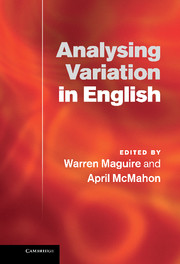Book contents
- Frontmatter
- Contents
- List of figures
- List of tables
- List of contributors
- List of abbreviations
- Introduction. Analysing variation in English: what we know, what we don't, and why it matters
- Part I Investigating variation in English: how do we know what we know?
- Part II Why does it matter? Variation and other fields
- 7 Variation and linguistic theory
- 8 Variation and change
- 9 Variation and forensic linguistics
- 10 Variation and identity
- 11 Variation and populations
- 12 Variation and education
- Notes
- References
- Index
7 - Variation and linguistic theory
from Part II - Why does it matter? Variation and other fields
Published online by Cambridge University Press: 03 May 2011
- Frontmatter
- Contents
- List of figures
- List of tables
- List of contributors
- List of abbreviations
- Introduction. Analysing variation in English: what we know, what we don't, and why it matters
- Part I Investigating variation in English: how do we know what we know?
- Part II Why does it matter? Variation and other fields
- 7 Variation and linguistic theory
- 8 Variation and change
- 9 Variation and forensic linguistics
- 10 Variation and identity
- 11 Variation and populations
- 12 Variation and education
- Notes
- References
- Index
Summary
Introduction
It may seem surprising, but linguistic variation is often seen as a ‘problem’ for linguistic theory. The models that formalist, theoretically minded linguists work with typically assume that linguistic behaviour is categorical and idealise away from the variation that is found in speech. The justification for this, following Chomsky (1965), is that much of the variation found in utterances is due to non-linguistic factors, and thus idealisation is necessary in order to see the underlying patterns behind speakers' linguistic performance. A number of strands of work in theoretical linguistics have, however, sought to take linguistic variation seriously, and they form the topic of this chapter, along with the argumentation that arises when linguistic theorists talk about (or refuse to talk about) linguistic variation.
It's no secret that languages like English are full of variation. If illustration is needed, let us consider a simple sentence like (1), which might describe a woman giving her coat to her brother.
(1) Betty took off her coat and gave him it.
If we limit ourselves to syntactic and phonological variation (as I do throughout this chapter), we could imagine a number of ways in which speakers of English might utter (1), or something very close. As a speaker of English born and raised in the English East Midlands, I could easily utter (1), but I could also utter (2).
- Type
- Chapter
- Information
- Analysing Variation in English , pp. 151 - 177Publisher: Cambridge University PressPrint publication year: 2011
- 5
- Cited by



